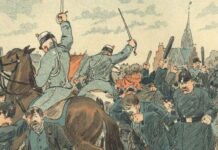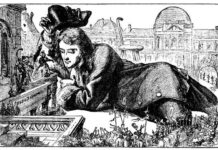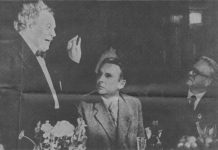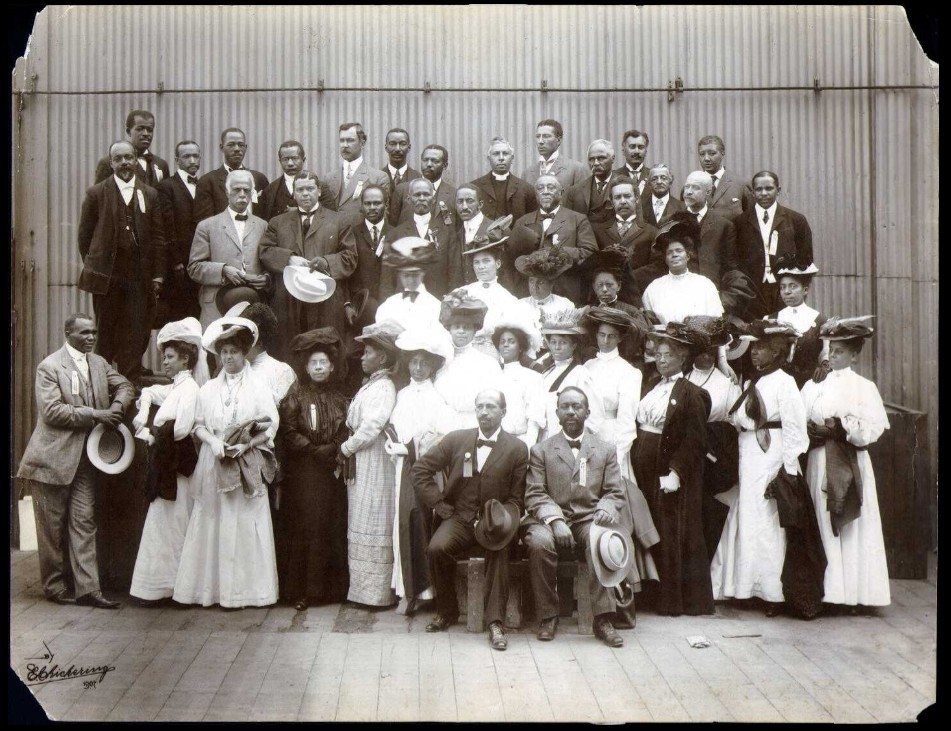
Socialistisk Biblioteks Tidslinje med links til begivenheder og personer i 1868.
Se også Index over personer, organisationer/partier og værker (som bøger, malerier, mm.), steder, begivenheder, mv., der er omtalt på hele Tidslinjen, titler og indhold på emnelisterne osv.
Bladliste
Nye blade 1868:
Arbeideren
Se:
Arbejderhistorisk bladliste, under året 1868.
[sta_anchor id=”18680223″ /]
23. februar 1868
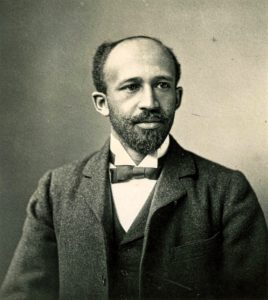
Afro-amerikanske leder W(illiam) E(dward) B(urghardt). Du Bois fødes i Great Barrington, Massachusetts, (dør 27.8.1963 i Accra, Ghana). Medstifter af borgerretsbevægelsen NAACP, 12.2.1909, og anses for den panafrikanske bevægelses fader.
Leksikale etc.:
- Du Bois, William Edward Burghardt (Det Danske Fredsakademi: Freds- og sikkerhedspolitisk leksikon)
- W.E.B. Du Bois (NAACP History)
- W.E.B. Du Bois (1868-1963) (World History Archives). See here: A biographical sketch of W.E.B. Du Bois.
- W. E. B. Du Bois (Wikipedia.org). Længere artikel med mange links, også til tekster af Du Bois.
- The Souls of Black Folk (Wikipedia.org)
- Black Reconstruction (Wikipedia.org)
- WEB Du Bois (Libcom.org). Books and articles online by Du Bois.
- W. E. B. Du Bois Papers (University of Massachusett, Special Collections). “Includes over 100,000 items of correspondence etc., speeches, articles, short stories and fables, poetry, photographs, newspaper clippings, memorabilia, videotapes, audiotapes, and miscellaneous materials.”
Artikler:
W.E.B. Du Bois var den første sociolog, der tog spørgsmålet om race alvorligt. Af Nicolai von Eggers (Information/Moderne tider, 21. januar 2023). “Sociologen og aktivisten W.E.B. Du Bois (1868-1963) er gradvist blevet etableret som en af de store skikkelser i moderne politisk tænkning. En ny antologi [W.E.B. Du Bois: International Thought, Cambridge University Press, 2022, 300 p.] samler hans skrifter om internationale forhold og viser, hvordan Vesten svigtede sine egne idealer.” Under betalingsmur.
How black Marxists have understood racial oppression (Jacobin, February 17, 2025). Jonah Birch interviews Jeff Goodwin: “The rich tradition of Black Marxist thought — one that includes W. E. B. Du Bois, C. L. R. James, and Frantz Fanon, among many others — emphasizes the centrality of capitalism to racial oppression and the destructiveness of that oppression for all workers.”
Marx or Jefferson? By Dylan Riley (New Left Review/Sidecar, 26 January 2024). “It may be, after all, that Du Bois is best understood neither as a theorist of intersectionality avant la lettre, nor as a Marxist, but rather as a radical and consistent democrat.”
The dilemma for “Du Boisian Sociology”. By Jeff Goodwin (Catalyst, Vol.7, No.2, Summer 2023). “José Itzigsohn and Karida L. Brown’s highly praised The Sociology of W.E.B. Du Bois [New York University Press, 2020, 304 p.] takes the second path, and the result is a tendentious book that will confuse and mislead readers interested in Du Bois’s work and legacy.”
Black Reconstruction as class war. By Jeff Goodwin (Catalyst, Vol.6, No.1, Spring 2022). “W.E.B. Du Bois’s Black Reconstruction in America, 1860-1880 is one of the greatest modern studies of revolution and counterrevolution. While it deserves its place alongside the classics, it is also an extraordinary example of a materialist and class analysis of race under capitalism. In recent years, the latter aspect of the book has been obscured and even denied. This essay seeks to restore Du Bois’s great work to its rightful place on both counts.”
W.E.B. Du Bois was the father of Pan-African Socialism. By Bill V. Mullen (Jacobin, May 2, 2022). “The author of Black Reconstruction was also one of the pioneers of Pan-African socialism. Working with and influencing figures like George Padmore, C.L.R. James, and Kwame Nkrumah, Du Bois sowed the seeds of global revolt against racism and capitalism.”
Honoring Dr Du Bois (Jacobin, January 21, 2019). “Shortly before his death, Martin Luther King delivered a speech at Carnegie Hall in honor of another legendary black radical: W.E.B. Du Bois. We reprint it here in full.”
The legacy of Black Reconstruction. By Robert Greene II (Jacobin, 27 August 2018). “W.E.B. Du Bois’s Black Reconstruction in America thrust African Americans into the role of historical actors and showed that the black freedom struggle has always been one for radical democracy.”
“I lifted up mine eyes to Ghana”. By Keisha N. Blain (Jacobin, 27 August 2018). “W.E.B. Du Bois died on this day in 1963. Few figures were more influential in shaping the struggle against colonialism.”
W.E.B. Du Bois and black sovereignty (Verso, Blog, 1 September 2017). “Cedric Robinson’s contribution to the collection (1994) traces the evolution of W.E.B. Du Bois’ position on Liberia and his relations with the country’s Americo-Liberian elite.”
Negroes and the crisis of capitalism in the United States (1953). By W.E.B. Du Bois (Monthly Review, Vol.54, No.11, April 2003). “We are reprinting this essay in honor both of the hundredth anniversary of the publication of The Souls of Black Folks …”
The African Roots of War. By W.E.B. Du Bois (Anti-imperialism.org, 25 June 2016). “First published in The Atlantic Monthly, 1915. Here edited for length and relevancy to the modern reader.”
When W. E. B. Du Bois was Un-American. By Andrew Lanham (Boston Review, January 13, 2017). “February 1951 [he] was indicted, arrested, and arraigned in federal court as an agent of the Soviet Union because he had circulated a petition protesting nuclear weapons.”
W.E.B. Du Bois: Revolutionary across the color line. By Tony Phillips (Socialist Review, Issue 417, October 2016). Review of Bill V. Mullen’s book (Pluto Press, 2016, 192 p.). “This little books charts Du Bois’s journey from bourgeois reformer to socialist.” See also: Across the color line (Inside Higher Ed, October 12, 2016). Scott McLemee talks with Bill Mullen.
A new window on the radicalism of W. E. B. Du Bois. By Paul Heideman (International Socialist Review, Issue 100, Spring 2016). Review of Bill Mullen, UnAmerican: W. E. B. Du Bois and the Century of World Revolution (Temple University Press, 2015, 258 p.). “Mullen shows us how central revolutionary thought was to Du Bois’ entire intellectual trajectory in the twentieth century.”
W.E.B. Du Bois, black agency and the slaves’ Civil War. By Brian Kelly (International Socialist Review, Issue 100, Spring 2016). “Du Bois’s withering assault on this racist orthodoxy remains, eighty years later, the most intellectually courageous intervention in all of American historical writing.”
W.E.B. Du Bois: Black Reconstruction in America 1860–1880. Review by Keeanga-Yamahtta Taylor (International Socialist Review, Issue 56, November–December 2007). “Written in 1935, Black Reconstruction literally rewrote the official history of the Civil War and Reconstruction eras.”
Remembering W.E.B. Du Bois. By Bill Fletcher Jr. (MR Online, August 21, 2003). “For us the work and life of Du Bois was particularly significant because of his commitment to the struggle against racist discrimination at home as well as against imperialism and colonialism abroad.”
W.E.B. Du Bois and his work. By William Gorman (Fourth International, Vol.11, No.3, May-June 1950). “As he approaches eighty-two, no higher tribute can be paid William Edward Burghardt Du Bois than that it is impossible to seriously consider the Negro in America without being confronted by his name at every turn.”
Marxism and the Negro Problem. By W.E.B. Du Bois (Anti-imperialism.org, 23 February 2017). “What follows is excerpted from WEB Du Bois’ [article], published in The Crisis, 1933.”
Litteratur:
“W.E.B. Du Bois: Borgerrettighedsbevægelsens grand old man”, af Astrid Nonbo Andersen. I: Amerikanske tænkere: 14 intellektuelle der ændrede USA. Red. Astrid Nonbo Andersen og Christian Olaf Christensen (Informations Forlag, 2016, s.256-279 + 344-346). Se uddrag af kapitlet (Information.dk, 6. juli 2016)
Se også:
How black Marxists have understood racial oppression (Jacobin, February 17, 2025). Jonah Birch interviews Jeff Goodwin: “The rich tradition of Black Marxist thought — one that includes W. E. B. Du Bois, C. L. R. James, and Frantz Fanon, among many others — emphasizes the centrality of capitalism to racial oppression and the destructiveness of that oppression for all workers.”
Se også på Socialistisk Bibliotek:
Tidslinjen 12. februar 1909 om den amerikanske borgerrettighedsorganisation National Association for the Advancement of Colored People (NAACP).
[sta_anchor id=”18680328″ /]
28. [16. marts] 1868
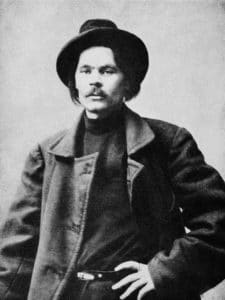
Den russiske sociale forfatter og socialist Maksim Gorkij fødes i Nizjnij Novgorod [1932-1990: Gorkij] (Dør 18. juni 1936 i Moskva)
Se:
- Gorkij, Maksim (Leksikon.org)
- Maksim Gorkij (Denstoredanske.dk)
- Maxim Gorky (Spartacus Educational)
- Maksim Gorkij (Wikipedia.dk) + Maxim Gorky (Wikipedia.org)
- Maxím Górky. By Peter Kropotkin (1904. The Independent, Vol. 57, No. 2924; Marxists Online Archive) ” he has found at last that happy combination of realism with idealism..”
- Maxim Gorky – 1868-1936 (Marxists Internet Archive). Incl. Biography – Portrait by Anatol Lunacharsky – Library (political writings.
- Maxim Gorkij 1868-1936 (Marxists Internet Archive/Svensk avdelning)
Maxim Gorky and the fellow travellers. By Cathy Porter (International Socialism, Issue 156, Autumn 2017, p.73-83). “Idolised as a writer, he became a figurehead for the Revolution. But his relationship with the new government was often a tense and difficult one, and he never joined the Party.”
Maxim Gorky: a playwright bitter about the state of society (Socialist Worker, Issue 2002, 27 May 2006). “A new production of the play Enemies leads Mike Haynes to look at the life of Russian writer Maxim Gorky.”
Recollections of Maxim Gorki (The New International, Vol.16, No.4, July-August 1950; online at Marxists Internet Archive). Pages from the Diary of Victor Serge (1945).
Eulogy for Maxim Gorky: A great proletarian humanist. By Georg Lukács (International Literature, No.8, August 1936; online at Marxists Internet Archive). “The last great writer of the European galaxy of realists is dead. And with him died the first great classic writer of Socialist realism.”
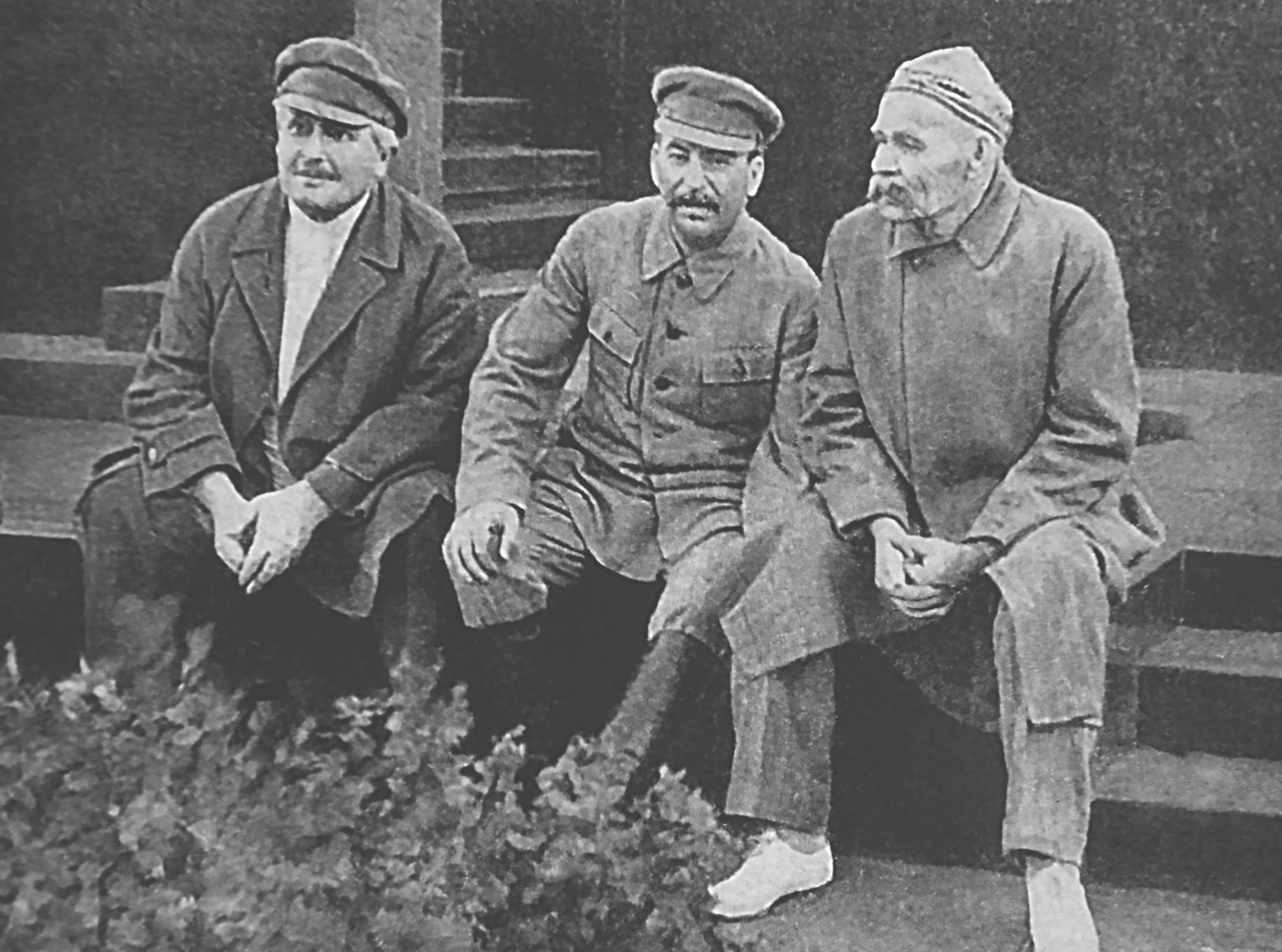
Gravskrift for Gorkij. Af Berthold Brecht (-i Svendborgdigte, side 183; Multivers Klassikere, 2017)
Her ligger / gesanten fra fattigkvartererne / beskriveren af folkets plageånder / og disses bekæmpere / som blev uddannet på landevejenes universiteter / født i små kår / som bidrog til at afskaffe systemet med høj og lav / folkets lærer / der har lært af folket.
Maxim Gorkys gravsted ved Kreml-muren i Moskva (med kort biografi på Gravsted.dk)
















